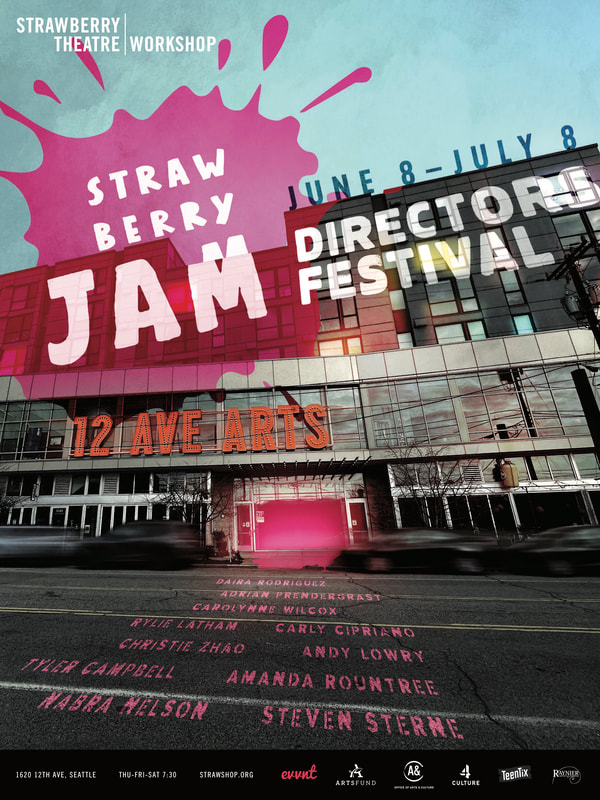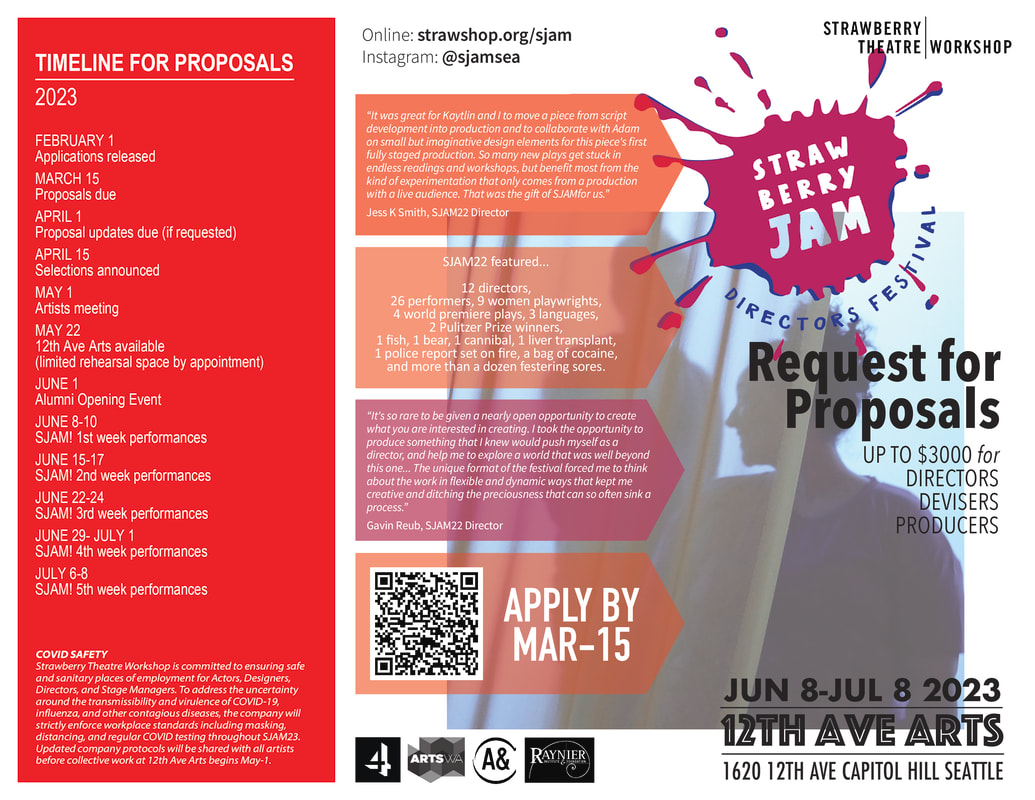|
Strawberry Jam
MISSION
Strawberry Jam is a five-week arts festival dedicated to providing local directors with the opportunity to grow their craft through practice. Motivated by an observation that Seattle's outstanding acting and playwriting communities are fueled by experimental forums not availabe to directors, SJAM was born in 2022 as a unique public workshop with the director at its center. Now in its second year, SJAM features veteran and emerging artists alike, working with texts ranging from classics to original works. For its audience, the event is a wide-ranging celebration of styles, visions, and voices packed into fifteen nights of relentless energy at 12th Ave Arts... All that makes a Strawberry Jam. TICKETS Plays change weekly, and a $45 FESTIVAL PASS entitles patrons to admission (non-transferable) for any night of the festival. To attend SJAM à la carte, tickets can also be purchased for SINGLE NIGHT events at $15. Each evening includes at least two plays. Reserve tickets at Brown Paper Tickets. For the safety of our performers, and to keep event cancelations to a minimum, all SJAM patrons must wear face masks. 2023 FESTIVAL LINE-UP JUNE 8-10 (7:30pm) Carolynne Wilcox & Hannah Votel direct “The Boxes We’re Kept In" Andy Lowry directs “Know When to Leave" JUNE 15-17 (7:30pm) Nabra Nelson directs “Paint Me" Steven Sterne directs “Do Frontier Women Need Husbands?" Rylie Latham directs “The Resurrectionist" JUNE 22-24 (7:30pm) Amanda Rountree directs “Glass. Kill. Bluebeard’s Friends" Carly Cipriano directs "Catslut!!!” JUNE 29-JULY 1 (7:30pm) Daira Rodriguez directs “Elyse and Mae Play the Most Epic Game of Life Ever" Adrian Prendergast directs “Minutes and Seconds" JULY 6-8 (7:30pm) Tyler Campbell directs “Brotherly Love" Christie Zhao directs "Caught" Christie ZhaoExamining Journalism through the Lens of Director Christie Zhao by TeenTix Press Corps Writer Raika Roy Choudhury Masterfully maneuvering the challenges of cultural and linguistic differences, Director Christie Zhao is dedicated to shining light on “essential truths” about our social and political realms through theater. Stumbling upon theater classes whilst pursuing, and soon achieving, a degree in computer science, Zhao unexpectedly “fell deeper and deeper” into its activist potential and culture. In March of 2022, after working in a software engineer role, Zhao even founded Yun Theatre, a nonprofit dedicated to building a multilingual theater community and creating radical theater in the Pacific Northwest. To Director Zhao, “Journalism is a form of theater.” And theater, she notes, is “a space to bring people together to embody a story… either far or close to us,” where everyone can “reflect and experience at the same time.” Theater is important because it forces proximity to heavy issues, calling the audience’s attention and care to them. It is a medium that “embraces the subjectivity of journalism,” reflecting the “essential truth” of life. For Zhao, her genre of theater is a way to “reclaim the agency of [her] own language,” truly speaking to the versatility of the art form. “For me, from China, I didn’t really have a space to talk about any social issues. We didn’t have the agency to care about society. It was all about studying hard,” Zhao describes. Theater was an avenue for her to “express and feel [herself]” where she “learned to build a space where people feel safer to talk,” something she described to be incredibly important, especially for her Chinese immigrant community. Zhao’s past style of theater, though diversely executed, has all been motivated by and responded to real-life upsets in China, acting against censorship and capturing the feelings and reactions of the Chinese community to those events. Zhao intended these works to connect to a Chinese audience, and, to artfully honor the experiences involved and uphold Yun Theatre’s inclusivity mission, they were also delivered fully in Mandarin but subtitled in English. However, because these plays were shown in America, Zhao encountered the dilemma of having “a different audience that has a different lens to look at things” with. That is where Caught came in, showcasing the nuances of certain aspects of Chinese culture through an American lens. Caught happens “outside of the traditional theater plays… break[ing] the boundary of what is theater.” In Zhao’s words, it explores the “American perception of what China is.” It’s a puzzle, where all “definitions have a contour and you have to challenge what people tell to be the truth.” There’s more than just a story to take away, it matters most to look beyond and understand the bigger picture. Daira Rodriguez
|



